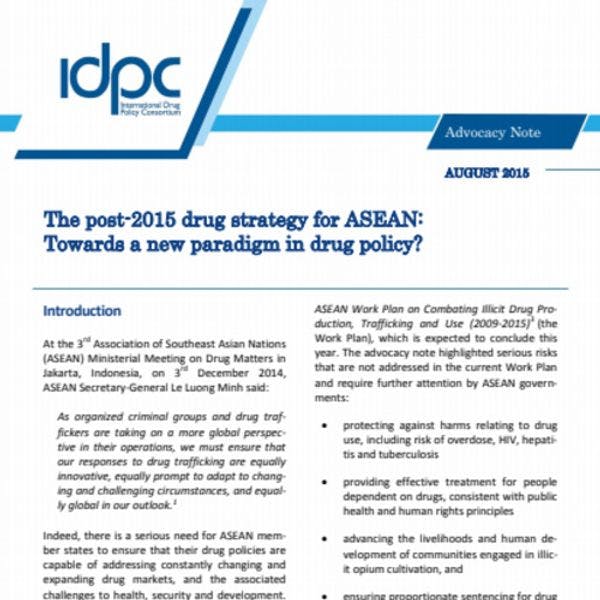La estrategia sobre drogas de ASEAN post-2015: hacia un nuevo paradigma?
Esta nota de incidencia política del IDPC ofrece un análisis y recomendaciones con el fin de contribuir al desarrollo de una nueva estrategia en materia de drogas para ASEAN post-2015. Más información, en inglés, está disponible abajo.
Suscríbase a las Alertas mensuales del IDPC para recibir información sobre cuestiones relacionadas con políticas sobre drogas.
At the 3rd Association of Southeast Asian Nations (ASEAN) Ministerial Meeting on Drug Matters in Jakarta, Indonesia, on 3rd December 2014, ASEAN Secretary-General Le Luong Minh said:
As organized criminal groups and drug traffickers are taking on a more global perspective in their operations, we must ensure that our responses to drug trafficking are equally innovative, equally prompt to adapt to changing and challenging circumstances, and equally global in our outlook.
Indeed, there is a serious need for ASEAN member states to ensure that their drug policies are capable of addressing constantly changing and expanding drug markets, and the associated challenges to health, security and development. As the region moves toward greater integration with the establishment of the ASEAN Economic Community in 2015, member states will face enhanced risks due to easing restrictions on the movement of people and goods across borders – but also heightened opportunities for regional collaboration in managing those risks.
In its 2014 advocacy note, A Drug-free ASEAN by 2015: Comments on the final assessment from a civil society perspective, the International Drug Policy Consortium (IDPC) offered comments and recommendations on the final assessment of the ASEAN Work Plan on Combating Illicit Drug Production, Trafficking and Use (2009-2015) (the Work Plan), which is expected to conclude this year. The advocacy note highlighted serious risks that are not addressed in the current Work Plan and require further attention by ASEAN governments:
- protecting against harms relating to drug use, including risk of overdose, HIV, hepatitis and tuberculosis
- providing effective treatment for peopledependent on drugs, consistent with public health and human rights principles
- advancing the livelihoods and human development of communities engaged in illicit opium cultivation, and
- ensuring proportionate sentencing for drug offences, and addressing the negative consequences of disproportionate sentencing, notably overcrowded prisons.
As the ASEAN Senior Officials on Drug Matters (ASOD) group develops a new drug strategy to take effect from 2016, it is hoped that the most serious harms relating to drug markets and the negative consequences of zero-tolerance approaches will be considered and addressed.
This advocacy note, drafted by the International Drug Policy Consortium, offers analysis and recommendations to contribute to the development of a post- 2015 ASEAN drug strategy that can meet the expectations of the ASEAN Secretary-General in being innovative, prompt to adapt to changing and challenging circumstances, and global in its outlook.
Keep up-to-date with drug policy developments by subscribing to the IDPC Monthly Alert.
Descargas
Temas
Regiones
Perfiles relacionados
- International Drug Policy Consortium (IDPC)
